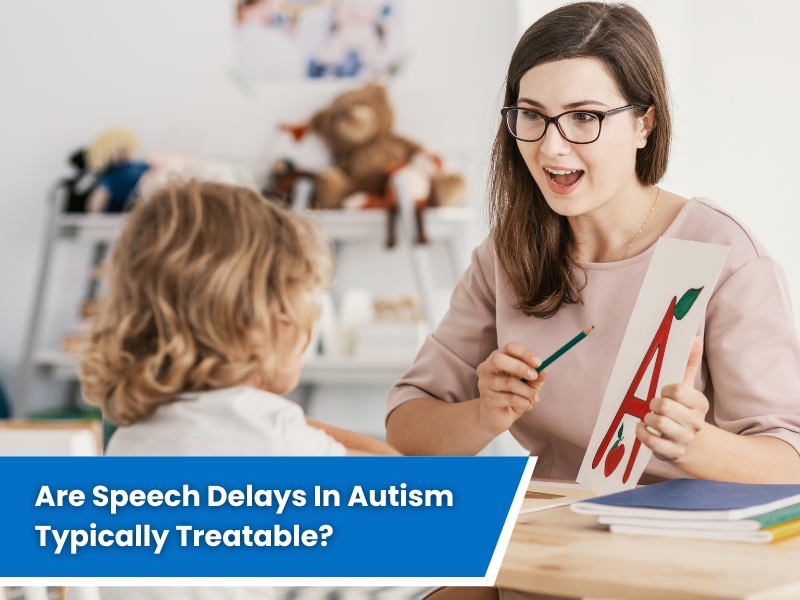Autism often presents challenges in communication, with many individuals experiencing speech delays. While these delays can be concerning for both parents and caregivers, it’s important to remember that effective treatment options are available. A speech delay in autism is typically treatable with the right support and intervention. This article will explore the different aspects of speech delays in autism, how speech therapy can help, and the role of early intervention in improving communication skills.
What are the common signs of communication delays in autism?
Children with Autism Spectrum Disorder (ASD) may show a variety of signs related to communication delays. These signs often manifest differently from one individual to another, but common indicators include:
- Delayed speech development: Limited or no speech by the expected age (typically by 2-3 years).
- Limited verbal communication: Difficulty forming sentences, using words repetitively, or limited vocabulary.
- Difficulty understanding language: Struggles with following instructions, understanding complex language, or responding to questions.
- Limited non-verbal communication: Challenges in using gestures, facial expressions, or eye contact.
- Difficulty with social interactions: Trouble engaging in conversations, taking turns, or using language appropriately in social settings.
Recognising these early signs is crucial. It allows parents and caregivers to take the first steps towards seeking support, including speech therapy, to aid in the child’s communication development.
How can speech therapy help with speech delays in autism?
Speech therapy is a crucial treatment for children with autism experiencing a speech delay. A qualified speech therapist can help improve various aspects of communication. Here’s how speech therapy can assist:
- Enhancing verbal skills: Helping children develop a stronger vocabulary and the ability to form sentences.
- Improving non-verbal communication: Teaching the use of gestures, facial expressions, and body language.
- Developing social communication skills: Focusing on turn-taking, conversation skills, and understanding social cues.
- Addressing speech articulation: Working on clarity and pronunciation to improve speech intelligibility.
- Supporting understanding: Helping children comprehend language, instructions, and social contexts better.
Speech therapy, particularly when tailored to each individual’s needs, can profoundly impact the communication abilities of children with autism.
Are there different approaches for treating speech delays in autism?
There are various approaches to speech therapy that cater to the specific needs of children with autism. Some of the most effective methods include:
- Applied Behaviour Analysis (ABA): Focuses on teaching communication through positive reinforcement. It’s commonly used in early intervention and helps children learn new skills.
- Picture Exchange Communication System (PECS): This system uses pictures to help children with limited verbal skills communicate their needs.
- Speech-Language Therapy: Involves structured sessions where the therapist works on improving speech, language comprehension, and social skills.
- AAC (Augmentative and Alternative Communication): This method uses devices, apps, or symbols to assist with communication for children who have severe speech delays.
- Social Skills Training: This program teaches children appropriate social behaviours and how to interact with others, enhancing their communication in real-life situations.
Each child is unique, and speech therapy should be tailored to suit their specific needs, strengths, and preferences.
How effective is early intervention for treating speech delays in autism?
Early intervention plays a critical role in treating a speech delay in autism. The earlier a child receives speech therapy, the more likely they are to experience significant improvement. Additionally, understanding the root causes of articulation disorders in toddlers can help parents and caregivers identify early signs and seek appropriate interventions. Some benefits of early intervention include:

- Brain development: The brain is more adaptable in early childhood, making learning new skills, including communication easier.
- Improved language outcomes: Children who receive early speech therapy tend to have better long-term speech and language development.
- Increased social skills: Early intervention helps children develop essential social skills, improving their ability to engage with peers and adults.
- Better family outcomes: Early treatment can reduce frustration and stress for both the child and their family, fostering stronger relationships.
Speech therapy, when implemented early, can make a remarkable difference in a child’s development and their ability to communicate effectively.
Can speech delays in autism improve over time with therapy?
Speech delays in autism can improve significantly over time with consistent therapy. However, the degree of improvement varies from child to child. Factors that influence the effectiveness of therapy include:
- The severity of the delay: Children with more severe delays may require longer or more intensive therapy.
- The age of the child: Due to their developing brains, younger children tend to respond better to speech therapy.
- The frequency of therapy: Consistent, ongoing treatment increases the likelihood of long-term improvement.
- Parental involvement: Active involvement from parents and caregivers can accelerate progress as they reinforce skills learned in therapy sessions at home.
While progress can take time, therapy can lead to meaningful improvements, enabling autistic children to communicate more effectively.
What support services are available for speech therapy in Auburn?
In Auburn, NSW, several services are available to support autistic children in their speech development.
- Speech therapy: Tailored sessions aimed at improving communication skills.
- Behaviour support: Assisting children in managing behaviours that may interfere with communication.
- Occupational therapy: Addressing the physical aspects of communication, such as motor skills and coordination.
- Early childhood intervention: Specialised support for young children to improve their overall development.
- Telehealth services: Convenient online therapy sessions for families needing flexible scheduling or living outside the area.
These services provide a comprehensive approach to supporting children with autism and their families, helping to create an inclusive and supportive environment for all involved.
How can personalised care impact speech therapy outcomes for children with autism?
The importance of individualised therapy for autism lies in its ability to address each child’s unique challenges and strengths. This is why personalised care is essential when it comes to speech therapy. Here’s how personalised care enhances outcomes:
- Tailored strategies: Each child’s therapy plan is designed to meet their specific needs, ensuring that treatment is relevant and effective.
- Flexible approaches: Personalised care allows for flexibility in adapting the therapy to the child’s progress, ensuring continued growth.
- Close monitoring: Therapists can track progress closely and make necessary adjustments to optimise results.
- Collaboration with families: Personalised care involves families in the therapeutic process, allowing them to reinforce strategies at home.
Effective speech delay treatment for autism focuses on tailored approaches that address each child’s unique needs. The commitment to personalised care is a key factor in achieving successful outcomes in speech therapy.
What role do families play in supporting speech development in autism?
Families play an integral role in supporting speech development for children with autism. Their involvement can make a significant difference in the success of therapy. Some ways families can support speech development include:

- Reinforcing therapy at home: Parents can practice skills learned in therapy sessions with their children.
- Creating a supportive environment: Encouraging communication in a calm, positive, and supportive setting helps children feel more comfortable expressing themselves.
- Being patient: Progress can be slow, so families need to remain patient and celebrate small successes.
- Advocating for the child: Families can work with therapists, schools, and other professionals to meet their child’s needs.
The involvement of families not only helps reinforce speech therapy but also creates a nurturing environment that supports long-term success.
Start your child’s speech therapy journey with Auburn Health Centre
If you’re seeking effective speech therapy for children with autism, Auburn Health Centre is here to provide compassionate, personalised care. Families who have worked with us share glowing feedback, with many highlighting the positive impact of our early childhood therapies. Parents have seen their children gain confidence, develop new skills, and progress significantly. Our welcoming, professional team ensures a supportive environment for every child, helping them feel comfortable and cared for throughout their therapy journey.
If you’re looking for a trusted partner in your child’s communication development, reach out to Auburn Health Centre today to learn how our tailored services can help your child thrive.
FAQs
- At what age should I start speech therapy for my child with autism?
Start as early as possible, ideally between 2-3 years old, to maximise progress.
- How long does speech therapy typically take to show results?
It varies, but improvements are often noticed within a few months of consistent treatment.
- Can speech therapy be combined with other therapies for better results?
Yes, combining speech therapy with other therapies like occupational or behavioural therapy can enhance overall progress.
- Is speech therapy covered by NDIS?
Yes, speech therapy is an NDIS-funded service for eligible participants.
- How do I know if my child’s speech delay is due to autism?
Look for other signs of autism, such as social difficulties, repetitive behaviours, and limited communication skills.
- What is the cost of speech therapy for autism in Auburn?
Costs vary depending on the provider and therapy plan, but NDIS funding may cover part or all of the expenses.
- How often should my child attend speech therapy sessions?
It depends on the child’s needs, but weekly sessions are common for consistent progress.
- Can my child receive speech therapy through telehealth services?
Yes, telehealth services are available for remote speech therapy sessions.
- What other services can support my child’s development along with speech therapy?
Services like occupational therapy, psychology, and behavioural support can complement speech therapy.
What are some signs that my child is making progress in speech therapy? Signs of progress include increased vocabulary, improved social interaction, and clearer speech patterns. Understanding the key indicators of progress in autism speech therapy can help track improvements and adjust strategies effectively.


